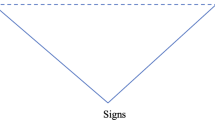Abstract
Teachers in the compulsory education sector interpret curriculum within their school setting to design educational programmes that address intended learning for students. This chapter reports on the use of Cultural-Historical Activity Theory to better understand the influences that guide teachers’ planning of school based curriculum and teaching pedagogy.
Access this chapter
Tax calculation will be finalised at checkout
Purchases are for personal use only
Preview
Unable to display preview. Download preview PDF.
Similar content being viewed by others
References
Bell, B. (2010). Theorising teaching. Waikato Journal of Education, 15(2), 21–40. Retrieved from http://doi.org/10.15663/wje.v15i2.111
Cobb, P., McClain, K., de Silva Lamberg, T., & Dean, C. (2003). Situating teachers’ instructional practices in the institutional setting of the school and district. Educational Researcher, 32(6), 13–24. Retrieved from http://doi.org/3699898
Dakers, J. (2011). Activity Theory as a pedagogical framework for the delivery of technology education. In M. Barak & M. Hacker (Eds.), Fostering human development through engineering and technology education (Vol. 6, pp. 19–34). Rotterdam, The Netherlands: Sense Publishers.
Dewey, J. (1938). Experience and education. New York, NY: Macmillan.
Eisner, E. W. (1994). The educational imagination (3rd ed.). New York, NY: Macmillan.
Engeström, Y. (1999). Activity Theory and individual and social transformation. In Y. Engeström, R.-L. Punamaki, & R. Miettinen (Eds.), Perspectives on Activity Theory (pp. 19–38). Cambridge, England: Cambridge University Press.
Hsu, P.-L., van Eijck, M., & Roth, W.-M. (2010). Students’ representations of scientific practice during a science internship: Reflections from an activity-theoretic perspective. International Journal of Science Education, 32(9), 1243–1266.
Korthagen, F. A. J. (2010). Situated learning theory and the pedagogy of teacher education: Towards an integrative view of teacher behavior and teacher learning. Teaching and Teacher Education, 26(1), 98–106. Retrieved from http://doi.org/10.1016/j.tate.2009.05.001
Lave, J. (1996). Teaching, as learning, in practice. Mind, Culture and Activity, 3(3), 149–164. Retrieved from http://doi.org/10.1207/s15327884mca0303_2
Lave, J., & Wenger, E. (1991). Situated learning: Legitimate peripheral participation. Cambridge, England: Cambridge University Press.
Leibowitz, B., Garraway, J., & Farmer, J. (2015). Influence of the past on professional lives: A collective summary. Mind, Culture and Activity, 22(1), 23–36. Retrieved from http://doi.org/10.1080/10749039.2014.979949
Magnusson, S., Krajcik, J., & Borko, H. (1999). Nature, sources, and development of pedagogical content knowledge for science teaching. In J. Gess-Newsome & N. G. Lederman (Eds.), Examining pedagogical content knowledge: The construct and its implications for science education (1st ed.,pp. 95–132). Dordrecht, The Netherlands: Kluwer Academic.
Marien, M. (Ed.). (1996). Environmental issues and sustainable futures: A critical guide to recent books, reports and periodicals. Bethesda, MD: World Future Society.
Marsh, C. (2009). Key concepts for understanding curriculum (4th ed.). New York, NY: Routledge. McGee, J., & Taylor, M. (2008). Planning for effective teaching and learning. In C. McGee & D. Fraser (Eds.), The professional practice of teaching (3rd ed., pp. 116–135). Melbourne, Victoria: Cengage Learning Australia.
Ministry of Education. (2007). New Zealand curriculum for English-medium teaching and learning in years 1–13. Wellington, New zealand: Learning Media Ltd.
New Zealand Qualifications Authority. (2011). Home NZQA. Retrieved May 2, 2011, from http://www.nzqa.govt.nz.ezproxy.waikato.ac.nz/
Nicholls, A., & Nicholls, H. (1972). Developing a curriculum: A practical guide. London, England: George Allen & Unwin.
Pearson, S. (2009). Using Activity Theory to understand prospective teachers’ attitudes to and construction of special educational needs and / or disabilities. Teacher and Teacher Education, 25(2009), 559–568. Retrieved from http://doi.org/10.1016/j.tate.2009.02.011
Pinar, W., Reynolds, W., Slattery, P., & Taubman, P. (1996). Understanding curriculum: An introduction to the study of historical and contemporary curriculum discourses (Vol. 17). New York, NY: Peter Lang.
Roth. (2004). Activity Theory and education: An introduction. Mind, Culture and Activity, 11(1), 1–8. Retrieved from http://doi.org/10.1207/s15327884mca1101_1
Roth, W., Tobin, K., Zimmermann, A., Bryant, N., & Davis, C. (2002). Lessons on and from the dihybrid cross: An activity–theoretical study of learning in coteaching. Journal of Research in Science Teaching, 39(3), 253–282. Retrieved from http://doi.org/10.1002/tea.10018
Said, M. N. H. M., Tahir, L. M., Ali, M. F., Noor, N. M., Atan, N. A., & Zaleha, A. (2014). Using Activity Theory as analytical framework for evaluating contextual online collaborative learning. International Journal of Emerging Technologies in Learning, 9(5), 54–59. Retrieved from http://doi.org/10.3991/ijet.v9i5.3972
Shulman, L. (1987). Knowledge and teaching: Foundations of the new reform. Harvard Educational Review, 57(1), 1–22.
Tilbury, D. (1995). Environmental education for sustainability: Defining the new focus of environmental education in the 1990s. Environmental Education Research, 1(2), 195–212. Retrieved from http://doi.org/10.1080/1350462950010206
Tyler, R. (1949). Basic principles of instruction. Chicago, IL: University of Chicago Press.
UNESCO. (2014). Education for sustainable development: United Nations decade (2005–2014). Retrieved December 4, 2014, from http://www.unesco.org/new/en/education/themes/leading-theinternational-agenda/education-for-sustainable-development/education-for-sustainable-development/
Wals, A. (2009). Review of contexts and structures for education for sustainable development. Paris, France: UNESCO.
World Commission on Environment and Development. (1987). Our common future. Oxford, England: Oxford University Press.
Author information
Authors and Affiliations
Editor information
Rights and permissions
Copyright information
© 2016 Sense Publishers
About this chapter
Cite this chapter
Lockley, J. (2016). Teachers Designing Classroom Curriculum through the Lens of Cultural-Historical Activity Theory. In: Gedera, D.S.P., Williams, P.J. (eds) Activity Theory in Education. SensePublishers, Rotterdam. https://doi.org/10.1007/978-94-6300-387-2_12
Download citation
DOI: https://doi.org/10.1007/978-94-6300-387-2_12
Publisher Name: SensePublishers, Rotterdam
Online ISBN: 978-94-6300-387-2
eBook Packages: EducationEducation (R0)




